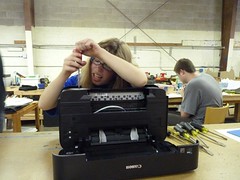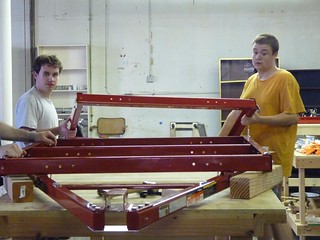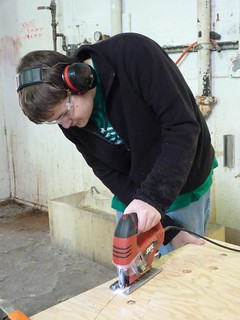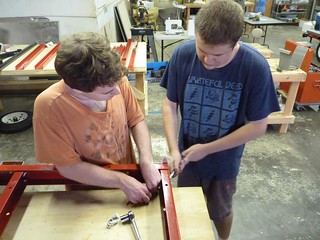Dan Swearingen | January 2, 2012
Many years ago Jeff Atwood (Coding Horror) graciously invited me to share in his Five Things You Didn’t Know About [Jeff Atwood] (and [his] office) post. I’m reposting it on this blog since Autistry is very much my life now.
I too have been humbled and impressed by the other people’s stories in the Five Things meme so here are mine:
1. I am baffled by other people’s fascination with professional sports.
I can identify with playing a sport – I just cannot understand the motivation behind the activity and entire economies driven by watching, talking, and writing about sports. That a city cares whether or not it has a football team and whether they have a nice stadium when at the same time its schools suck makes no sense to me. That a soccer fan needs to throw a beer bottle at someone who does not like their team makes no sense to me.
2. My family set me up to meet a girl they thought I’d like – and it worked.
I met my wife Janet at a family Thanksgiving dinner after months of my family telling me “oh, we want you to meet this girl we think you’ll like.” We’ve been together since that day in 1987.
3. I am an Astrophysicist by education.
 My career in software was a profitable side-effect. In school I was interested in everything and focusing on one thing to get a degree was a challenge. Science seemed to be a recurring interest and my employer at the time (Hewlett-Packard) would pay tuition in that area so I chose to major in physics. After my BS I changed schools to work on a Masters. I was at Cal. State Northridge and they had a world class solar observatory and the astronomers were nice to work with so my M.S. in Physics was based on research into the solar magnetic field structure’s relationship with gas brightness and velocity. For my Ph.D. I wanted to work on something other than solar astronomy so amongst the multitude of choices I had (I think it was two) I joined the astronomy department at Indiana University, Bloomington. I was there five and a half years and finished my coursework, my Physics and Astronomy Ph.D. qualifying exams, and made good progress on my dissertation research. However, family and financial pressures precluded my staying the extra one or two years it would have taken to complete my Ph.D so I left IU with a “thank you for playing” Masters in Astronomy. In the mean time I had picked up good programming skills that people were very interested in paying me for.
My career in software was a profitable side-effect. In school I was interested in everything and focusing on one thing to get a degree was a challenge. Science seemed to be a recurring interest and my employer at the time (Hewlett-Packard) would pay tuition in that area so I chose to major in physics. After my BS I changed schools to work on a Masters. I was at Cal. State Northridge and they had a world class solar observatory and the astronomers were nice to work with so my M.S. in Physics was based on research into the solar magnetic field structure’s relationship with gas brightness and velocity. For my Ph.D. I wanted to work on something other than solar astronomy so amongst the multitude of choices I had (I think it was two) I joined the astronomy department at Indiana University, Bloomington. I was there five and a half years and finished my coursework, my Physics and Astronomy Ph.D. qualifying exams, and made good progress on my dissertation research. However, family and financial pressures precluded my staying the extra one or two years it would have taken to complete my Ph.D so I left IU with a “thank you for playing” Masters in Astronomy. In the mean time I had picked up good programming skills that people were very interested in paying me for.
4. I am an artist by inclination.
My family is populated mainly by performing artists and musicians. Throughout my life I have built things with my hands and the design and construction of structures of fantasy remains my hobby. I’ve focused on model railroading but I also draw and build other 3D art forms. The artist in me determines whether I’m interested in a project: if there’s room for creativity I’m interested. If you just need me to turn the crank, I’d rather be digging ditches.
5. I’m a recovering Aspie (link)
This might be something you already know. In which case my not realizing you know is a demonstration that I have Asperger’s Syndrome. That’s an Aspie joke.
I was not diagnosed until I was in my 30s. I had always known I had to work especially hard at things that appear easy to people around me and all my life I have been known as “really smart – but weird.” It has been really helpful to have a diagnosis. It hasn’t changed anything I do but it has helped me feel vastly better about the coping mechanisms I employ. I still have most of the traditional problems Asperger’s deal with. Let’s face it, most good software developers are what we call “on the spectrum” so I’ve always fit in really well in good development organizations. However, unenlightened employers almost invariably feel I’m stubborn and arrogant when I’m actually very shy and I strive very hard to be a nice person. As far as being stubborn, I like to think I mitigate it by usually being right (although I now know it usually doesn’t matter that you’re right, I’m still naïve enough to be surprised). Fortunately, I’ve had enough really good employment experiences over the years to be comfortable with what part is me and what part is them.
In my fourth grade class we had a two day workshop put on by representatives from NASA. The Space Race was big in American life at that point. The activity was a simulated mission to Mars with the class divided into mission control and crews of two ships traveling together. On the morning of the first day we were informed that one of the ships had crashed on the surface of Mars and was unable to make the return flight. I was in charge of life support on one of the ships. In a few minutes I provided a solution with charts and resource burn-down graphs. By doing that I effectively ruined the next day and a half of the activity for the whole class.
Soon, after days of tests and interviews I spent less and less time in my regular class and starting in 5th grade was moved to a special class with a only six students (2 each in 4th, 5th, and 6th grades) and told I could study whatever I wanted. I studied the history of transportation, astronomy, puppet theater, building geometric shapes out of manila folders, whatever my interests wandered to. As a class we regularly left school and took a bus downtown to get books out of the San Francisco main branch library as needed since we exhausted the resources of the school library after a couple weeks.
For the next three years I was in the San Francisco schools I never sat in a regular classroom and had the most fun I ever had in school (until graduate school). Every now and then someone would stop by with a textbook and say something like “Dan, you really need to learn some math. Work these chapters, please?” A few days later I’d hand in the work and could go back to following my interests.
When I was middle-school age I moved away from San Francisco. High school and college were much harder. Many teachers mistook my shyness (silence) and inability to flow with the program as stupidity. They would put me in remedial reading one week and only to return me to “A track” (college prep) the next after demonstrating reading over 1200 words per minute (as high as their machine could go). I graduated high school with a D-plus GPA but nearly maxed out my SATs. Only in graduate school and when working on a Ph.D. in astrophysics was I having fun in school again.
 I’m a former United States Marine. That probably should make six things you didn’t know about me. I put it here in the Asperger’s portion because many of my most effective coping mechanisms were learned during training in the Corps and I’ll always be grateful for that. I also learned how to get shoes REALLY shiny.
I’m a former United States Marine. That probably should make six things you didn’t know about me. I put it here in the Asperger’s portion because many of my most effective coping mechanisms were learned during training in the Corps and I’ll always be grateful for that. I also learned how to get shoes REALLY shiny.
Category: Commentary, Team Blogs |
Comments Off on Five Things You Didn’t Know About Me
Tags:
 As we try to spread awareness and acceptance I find that it is much harder to garner support for adults. I do not really understand but seems that perhaps people believe when supporting younger kids there is hope for further growth and success but when reach adulthood then support just means some form of hand out or charity. So our mission becomes to educate the community that our young adolescents have much to contribute and that support for them also means further growth and success.
As we try to spread awareness and acceptance I find that it is much harder to garner support for adults. I do not really understand but seems that perhaps people believe when supporting younger kids there is hope for further growth and success but when reach adulthood then support just means some form of hand out or charity. So our mission becomes to educate the community that our young adolescents have much to contribute and that support for them also means further growth and success. I am not sure this message is really getting out there. Folks are listening but no one is engaging. We need to reach outside our safe community and engage others who truly would benefit from hiring our adolescents. I need everyone reading this to think of people that own a company or have the ability to hire on some of these adults. There are agencies out there that will partner with these employers. I am challenging you to think of one person or one company where you have a contact. You and others will feel so empowered to have helped. I have helped two agencies make contact with 2 law firms who have successfully placed two adults and I cannot express how much value these very special adults are bringing to these employers.
I am not sure this message is really getting out there. Folks are listening but no one is engaging. We need to reach outside our safe community and engage others who truly would benefit from hiring our adolescents. I need everyone reading this to think of people that own a company or have the ability to hire on some of these adults. There are agencies out there that will partner with these employers. I am challenging you to think of one person or one company where you have a contact. You and others will feel so empowered to have helped. I have helped two agencies make contact with 2 law firms who have successfully placed two adults and I cannot express how much value these very special adults are bringing to these employers.





 Several people have recently contacted me to talk about the lack of job training skills that our adolescents may be receiving as right now their full time job may just be to attend school. Also, not many schools integrate internships into the curriculum or as part of the IEP. Truthfully though this should really be part of any transition IEP. We need to create opportunities for our adolescents and we should find a way to get the schools to incorporate this into any IEP. You, however, must take initiative to discover these opportunities. An internship may be more appropriate than homework. A parent recently shared with me that the homework she has for her daughter is specific to life skills. This will ensure that there is continuity with these skills at home and provide better generalization. These skills may be cooking a meal or preparing lunch. If you have an adolescent who is strong academically but lacks basic hygiene or other skills that will allow them to be independent and also keep a job then you may want to consider how to balance this.
Several people have recently contacted me to talk about the lack of job training skills that our adolescents may be receiving as right now their full time job may just be to attend school. Also, not many schools integrate internships into the curriculum or as part of the IEP. Truthfully though this should really be part of any transition IEP. We need to create opportunities for our adolescents and we should find a way to get the schools to incorporate this into any IEP. You, however, must take initiative to discover these opportunities. An internship may be more appropriate than homework. A parent recently shared with me that the homework she has for her daughter is specific to life skills. This will ensure that there is continuity with these skills at home and provide better generalization. These skills may be cooking a meal or preparing lunch. If you have an adolescent who is strong academically but lacks basic hygiene or other skills that will allow them to be independent and also keep a job then you may want to consider how to balance this. Consider transportation needs if your adolescent will not drive. Our son took the bus on his own last week and walked to his job. We had to be very strategic as for the past year as he has been very resistant to doing this on his own. He practiced many times and we are having someone shadow him. He had to be the one to tell us he was ready which I believe to all be part of his own growth. As I often share with others we just cannot get caught up with the time it may take to gain a particular skill as many of our adolescents can take a long time to get there but when they get there they generally retain what they learned. We also worry about how others will react to him in public when he starts talking to himself or pacing or even just looking up all the time. He is very comfortable sharing with others that he has autism and we have talked to him about what he would do if someone reacted to his behavior. He has some responses but most importantly he has a cell phone so he can call us or anyone else that he knows can help him. Some day he will be on his own and we have to face these issues now so he knows how to manage them. Very overwhelming as a parent. I am most motivated by the fact that I want his younger brother to have his own life and choices as he will likely be C guardian some day when we are no longer here. If C is able to live independently and work with support of GGRC this will not fall on my younger son.
Consider transportation needs if your adolescent will not drive. Our son took the bus on his own last week and walked to his job. We had to be very strategic as for the past year as he has been very resistant to doing this on his own. He practiced many times and we are having someone shadow him. He had to be the one to tell us he was ready which I believe to all be part of his own growth. As I often share with others we just cannot get caught up with the time it may take to gain a particular skill as many of our adolescents can take a long time to get there but when they get there they generally retain what they learned. We also worry about how others will react to him in public when he starts talking to himself or pacing or even just looking up all the time. He is very comfortable sharing with others that he has autism and we have talked to him about what he would do if someone reacted to his behavior. He has some responses but most importantly he has a cell phone so he can call us or anyone else that he knows can help him. Some day he will be on his own and we have to face these issues now so he knows how to manage them. Very overwhelming as a parent. I am most motivated by the fact that I want his younger brother to have his own life and choices as he will likely be C guardian some day when we are no longer here. If C is able to live independently and work with support of GGRC this will not fall on my younger son.





 I always believed that a diploma was the most important goal for him. He was on that track until at 17 I realized that he would be better served with school services until he reaches 21. I truly believed that a diploma would give him more credibility and recognition and provide more options. In reality C will always need support. A diploma would not give him access to what he really would need to become independent. While we can get focused on cognitive abilities there are many things to truly consider when evaluating options post high school. Pushing further academics was also creating a lot of anxiety which interfered with overall growth for C. There is a lot to consider as well with services such as supplemental social security, golden gate regional center and how to ensure that our kids get the right support to move toward independence
I always believed that a diploma was the most important goal for him. He was on that track until at 17 I realized that he would be better served with school services until he reaches 21. I truly believed that a diploma would give him more credibility and recognition and provide more options. In reality C will always need support. A diploma would not give him access to what he really would need to become independent. While we can get focused on cognitive abilities there are many things to truly consider when evaluating options post high school. Pushing further academics was also creating a lot of anxiety which interfered with overall growth for C. There is a lot to consider as well with services such as supplemental social security, golden gate regional center and how to ensure that our kids get the right support to move toward independence



 My career in software was a profitable side-effect. In school I was interested in everything and focusing on one thing to get a degree was a challenge. Science seemed to be a recurring interest and my employer at the time (Hewlett-Packard) would pay tuition in that area so I chose to major in physics. After my BS I changed schools to work on a Masters. I was at Cal. State Northridge and they had a world class solar observatory and the astronomers were nice to work with so my M.S. in Physics was based on research into the solar magnetic field structure’s relationship with gas brightness and velocity. For my Ph.D. I wanted to work on something other than solar astronomy so amongst the multitude of choices I had (I think it was two) I joined the astronomy department at Indiana University, Bloomington. I was there five and a half years and finished my coursework, my Physics and Astronomy Ph.D. qualifying exams, and made good progress on my dissertation research. However, family and financial pressures precluded my staying the extra one or two years it would have taken to complete my Ph.D so I left IU with a “thank you for playing” Masters in Astronomy. In the mean time I had picked up good programming skills that people were very interested in paying me for.
My career in software was a profitable side-effect. In school I was interested in everything and focusing on one thing to get a degree was a challenge. Science seemed to be a recurring interest and my employer at the time (Hewlett-Packard) would pay tuition in that area so I chose to major in physics. After my BS I changed schools to work on a Masters. I was at Cal. State Northridge and they had a world class solar observatory and the astronomers were nice to work with so my M.S. in Physics was based on research into the solar magnetic field structure’s relationship with gas brightness and velocity. For my Ph.D. I wanted to work on something other than solar astronomy so amongst the multitude of choices I had (I think it was two) I joined the astronomy department at Indiana University, Bloomington. I was there five and a half years and finished my coursework, my Physics and Astronomy Ph.D. qualifying exams, and made good progress on my dissertation research. However, family and financial pressures precluded my staying the extra one or two years it would have taken to complete my Ph.D so I left IU with a “thank you for playing” Masters in Astronomy. In the mean time I had picked up good programming skills that people were very interested in paying me for. I’m a former United States Marine. That probably should make six things you didn’t know about me. I put it here in the Asperger’s portion because many of my most effective coping mechanisms were learned during training in the Corps and I’ll always be grateful for that. I also learned how to get shoes REALLY shiny.
I’m a former United States Marine. That probably should make six things you didn’t know about me. I put it here in the Asperger’s portion because many of my most effective coping mechanisms were learned during training in the Corps and I’ll always be grateful for that. I also learned how to get shoes REALLY shiny.
